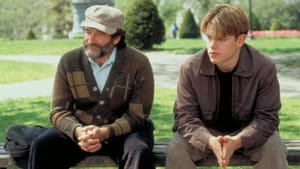Stay in the Loop
BSR publishes on a weekly schedule, with an email newsletter every Wednesday and Thursday morning. There’s no paywall, and subscribing is always free.
Battling monsters
Remembering Robin Williams (three)

And so we lose another brilliant artist to the monster of addiction and its constant companion, depression. Not all depressed people are addicts, but every addict, whether in recovery or not, has suffered from depression. It’s why they return, again and again, to the thing that is killing their souls. Or spend the rest of their lives shielding themselves from that thing, always with the awareness that the monster waits for them to lower their guard, even for a moment, and will pounce mercilessly if they do.
Robin Williams’s apparent suicide is all the more tragic because he tried, just a month ago, to deal with his issue proactively, checking himself into a rehab facility. Was his latest bout of despair triggered by the open heart surgery he’d had in 2009? We’ll never know. It isn’t uncommon, however, for those who have been through such procedures to be depressed, even without his difficult history.
Depression is far more common than we’d like to admit. According to a May 2014 Lancasteronline article, one in four of the adults in my hometown has shown signs of depression. That’s the same rate of diagnosis as diabetes. The Lancastergeneralhealth.org summary noted that in 2007, 30.9 percent of sixth- to twelfth-graders said they felt sad or depressed most days. Even more disturbing, Lancaster’s rate of depression and suicide is slightly lower than the state average. Maybe things have improved radically in the last seven years — the current economic and political climate would seem to argue against that, however.
But Robin Williams wasn’t an average Joe, just trying to get by. He was one of the most famous comedians in history, with a respected body of work, an Oscar, Golden Globes, money — everything. At least, from the outside. He was open about his struggles, which made it all the more shocking that the demons triumphed. His latest TV show, The Crazy Ones, was canceled, but such things are commonplace in television. I can’t name the last big movie he was in, but he has a number of films in the can, so it’s not like Hollywood had turned its back. What happened?
Wherever you go, there you are, and it seemed he could never fully escape from the fear that often leads addicts to self-medicate. In a 2010 interview, he told comedian Marc Maron that his 2006 stint in rehab, after 20 years of sobriety, was about “trying to fill the hole. It’s fear. You’re kind of going, ‘What am I doing in my career? . . . Where do you go next?'” From listening to interviews, I also think he was one of those sensitive souls who can’t fully turn off the world or forgive their own mistakes. A telling quote, from his 1986 one-man show at the Metropolitan Opera, is that he “realized that when I became a former alcoholic, I was the same asshole.”
Operating in overdrive
His comedy came from a mind that clearly worked in overdrive, taking in and spitting out references from all over the map, often making biting political observations along the way. His idols were Jonathan Winters, George Carlin, Lenny Bruce, and Richard Pryor. Certainly not icons of tranquility or strangers to drugs and/or mental illness. Robin Williams said that cocaine, which is usually a stimulant, slowed him down. Maybe he reached an impasse — his reality was too much to bear, but the things that had modulated that reality would slowly destroy him. To him, there must have been just one way out.
When Michael Jackson died, I was devastated. He was part of my childhood, a talent of such brilliance that it still continues to amaze me. When Whitney Houston died, I felt the same way, although the sting was a bit less acute. I was sad about Heath Ledger, too, because his brilliance seemed to predict many years of memorable performances — he was just as winning a Casanova as he was a terrifying Joker. Philip Seymour Hoffman hurt, too. Such a large body of work, all of it (that I’ve seen, at least), masterful. And yet, Robin Williams’s passing caught me off guard because his death was portrayed as deliberate, and somehow the tears of a clown seem all the more poignant.
I remember sneaking backstage, with a few of my Juilliard classmates who had also been tipped off, to watch Robin Williams giving a private lecture to the drama class. He was then as I will always remember him — surpassingly gifted, unpredictable, hilarious, wise. He gave us what he couldn’t give himself, in any sustained way — relief from our everyday lives, laughter, joy. And yet, I think my favorite roles of his were serious — Dead Poets Society and Good Will Hunting. Like many of us, I plan to watch these films again. And share them with my children, who know him primarily as the genie from Aladdin. So they, too, will fully understand what’s been lost.
More remembrances by Rich Heimlich, Tom Hannigan, Chris Predmore, Tara Lynn Johnson, Michael Lawrence, Gary L. Day, Thom Nickels, and Armen Pandola.
Sign up for our newsletter
All of the week's new articles, all in one place. Sign up for the free weekly BSR newsletters, and don't miss a conversation.

 Maria Thompson Corley
Maria Thompson Corley